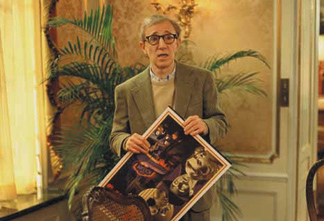Shmollywood Ending
Woody's Blind Conceit: Allen Treads Familiar Ground
By Patrick Reed

Has Woody accidentally made a Hollywood Ending?
Twenty-five years on from Annie Hall's showdown against Star Wars at the 1977 Academy Awards, Woody Allen and George Lucas are primed to hit the cineplexes again. To the eternal chagrin of Comic-Book Guys across
the globe, Allen's semi-autobiographical account of a morose stand-up comic's relationship troubles stole the thunder from Lucas' special-effects-laden space Western, and captured the Best Picture Oscar. Now, with Allen's Hollywood Ending opening a week and a half ahead of Star Wars Episode II: Attack of the Clones, everything seems business as usual with the unlikely duo: small-budget vs. big, talk and jokes vs. action and technology, critical response vs. popular acclaim. Since '77, both directors have had a remarkable amount of control over their work as well, although both work on entirely different creative canvases.
Alas, such autonomy can beget self-satisfaction and even lazinessand while Lucasfilm Ltd. currently prepares to mount a mass assault on all fronts of American culture, squashing any critical dissent with an elephantine force, in Woody's much more small and vulnerable New York City-world there is always the question of Allen's continued relevance, even in relation to the art-house niche he has counted on for so long. Hollywood Ending doesn't provide an encouraging response.
Allen's prolific pace has never lagged since the early 70s, and it can be argued that the once-impressive consistency of his work has been lost over the past decade. A survey of his films since the "Soon-Yi Scandal" finds a handful of lauded acting performances (Sean Penn in Sweet and Lowdown, Mira Sorvino-Oscar-winning and overrated-in Mighty Aphrodite), one widely-appreciated effort (Bullets Over Broadway) and several other movies featuring Allen in a prominent role, basically playing himself. Considering that Woody Allen has been battling his neuroses, flirting with nubile young females, and wittily railing against the emptiness of modern life ever since his stand-up days in the 60s-with Annie Hall and 1979's Manhattan marking the full maturation of Allen's onscreen persona, dubbed by David Thomson as "a Chaplin hero for the chattering classes"-it's legitimate to question why he keeps returning to the same well over and over again.
Hollywood Ending finds Allen as washed-up director Val Waxman, twice divorced and years removed from his last big success. His more recent ex Ellie (Téa Leoni) has relocated to L.A. to live with a bigshot studio exec (Treat Williams) and work in script development. When one of her projects, a 40s-film remake set in the Big Apple, finally gets greenlighted, Ellie convinces the studio to give Val a chance at career redemption, even though their split was acrimonious and Val loathes everything and everyone associated with Hollywood. Val's agent Al (Mark Rydell) serves as the key broker in the deal, and plans are soon set to shoot in NYC with minimal studio interference. Val's bimbo actress girlfriend (Debra Messing) leaves town for a spa, giving Val time to become unglued over his new working relationship with Ellie, whom he obviously still yearns for. After berating Ellie's adultery, her career choices, and her new lover in a crowded bar, Val calls up his agent with some perplexing news the night before the production opens: he's gone blind.
This plot contrivance serves as the fulcrum for the rest of Hollywood Ending's plot exposition as Val and his agent conspire to go ahead and make the picture; it allows Allen to recycle several of his most cherished routines, but with a new, lack-of-vision "twist." There's several physical comedy bits-a couple are funny, but none on the level of Sleeper or Zelig. Furthermore, many of Annie Hall's once-fresh bromides against Southern California and the studio system are updated for the cell-phone present, and when it is revealed that Val has an estranged son who is a punk rocker, Hollywood Ending even allows the culturally myopic Allen to poke fun at rock music once more. Save for a good one-liner here and there, Allen's barbs are tiresome; the territory has simply become too well-traveled. The romantic elements are unconvincing as well, and overall the script is sluggish, making the film's pace drag (a costly departure from Allen's best work).
It's probably far too late to expect anything daring from him, but Hollywood Ending feels like a well-worn, skipping record of Woody's clarinet doodling, in its own way just as safe as the West Coast pictures-by-committee that it tediously mocks. Perhaps the problem resides more with Allen as an actor than anything else-hang up the hand gestures and shrugging for good, man!-but the substandard Hollywood Ending gives every indication that we'll be getting more of Woody's calcified, feckless egocentrism in the years to come.
HOME | THIS ISSUE | ACE ARCHIVES